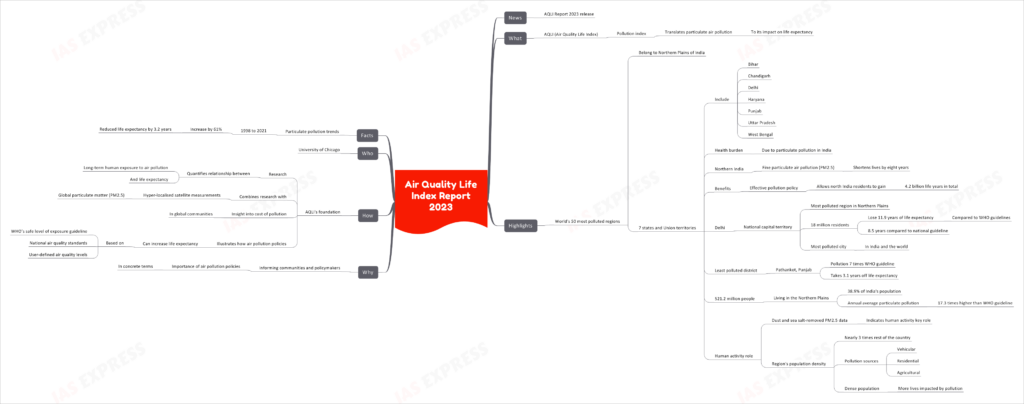Air Quality Life Index Report 2023

The release of the Air Quality Life Index (AQLI) Report 2023 has highlighted the grave consequences of air pollution on human life expectancy. Developed by the University of Chicago, the AQLI provides a unique perspective by translating particulate air pollution into its impact on life expectancy. The report’s findings underscore the urgent need for effective pollution control policies to safeguard the health and well-being of communities.
Understanding the AQLI
The Air Quality Life Index (AQLI) serves as a crucial tool for comprehending the relationship between air pollution and its detrimental effects on human life. It quantifies the impact of particulate air pollution on life expectancy, translating pollution levels into tangible years of life lost due to exposure.
Alarming Findings in Northern Plains of India
Concentration of Pollution
The AQLI Report reveals that the world’s 50 most polluted regions are concentrated in the Northern Plains of India. Seven states and Union territories, including Bihar, Chandigarh, Delhi, Haryana, Punjab, Uttar Pradesh, and West Bengal, bear a significant health burden due to particulate pollution.
Impact on Life Expectancy
In Northern India, fine particulate air pollution (PM2.5) shortens lives by an alarming eight years on average. However, effective pollution policies offer a glimmer of hope, allowing residents in this region to collectively gain 4.2 billion life years.
Struggles in Delhi
Delhi, the national capital territory, emerges as the most polluted city not only in India but also globally. Its 18 million residents lose 11.9 years of life expectancy compared to WHO guidelines, and 8.5 years compared to national guidelines.
The Role of Human Activity
The report underscores the crucial role of human activity in exacerbating pollution. The region’s population density, nearly three times that of the rest of the country, amplifies pollution sources such as vehicular, residential, and agricultural activities.
Informing Policy and Communities
Empowering Policymakers
The AQLI Report serves as a vital tool to inform policymakers about the concrete impact of air pollution. By illustrating the potential increase in life expectancy through various pollution control measures, the report highlights the importance of enacting effective policies.
Educating Communities
The report’s insights not only empower policymakers but also educate communities about the dire consequences of unchecked pollution. This awareness can foster a collective commitment to reducing pollution levels and protecting public health.
The Foundation and Methodology of AQLI
The AQLI is built upon extensive research that quantifies the relationship between long-term human exposure to air pollution and life expectancy. It combines research findings with hyper-localized satellite measurements of global particulate matter (PM2.5). By examining the cost of pollution in global communities, the AQLI underscores the potential for policies to enhance life expectancy based on various air quality standards.
If you like this post, please share your feedback in the comments section below so that we will upload more posts like this.

